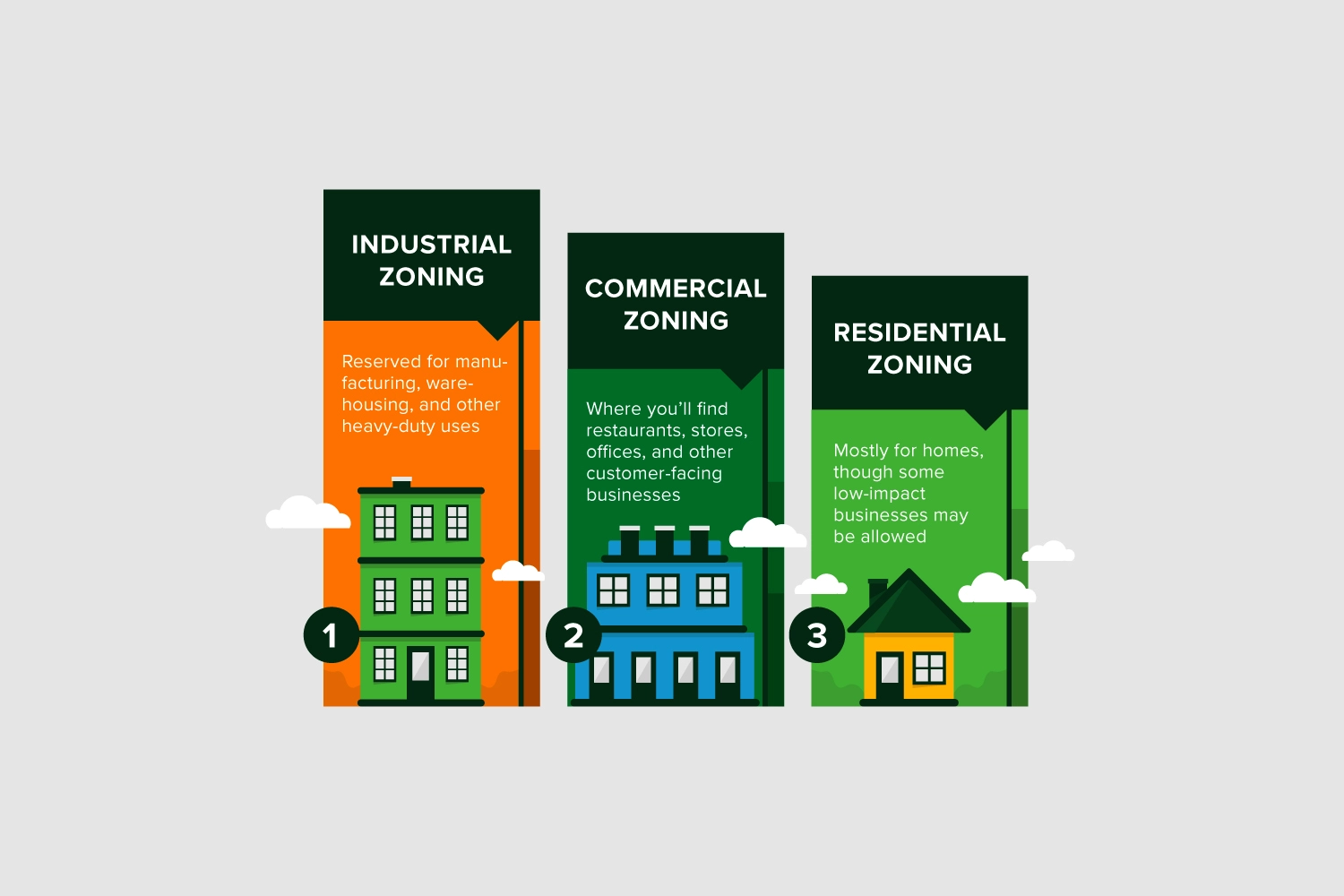Disclaimer: The articles published here on the City of Eau Claire Economic Development Division website are meant to be a helpful starting point as you explore doing business in our community. They’re not the final word on requirements or what’s best for your unique situation. We always recommend checking in with legal, financial, or other professionals for advice tailored to your business.
You’ve got the vision, the business name, and maybe even a logo. You’ve been eyeing a few spots around Eau Claire: Water Street, the west side, Clairemont Avenue, or one of the industrial parks. You’re ready to roll. But before you sign a lease or start remodeling, don’t forget to check this box too: zoning.
Double-checking that your location is zoned for your type of business can save you time, money, and a lot of frustration down the road. Here’s what you need to know.
What Is Zoning?
Zoning is how the City of Eau Claire organizes land use. It ensures that the right types of development happen in the right places so residents don’t end up with a noisy manufacturing facility next to their backyard. It also makes sure businesses have access to the infrastructure they need—think parking, utilities, and street access.
Eau Claire’s zoning code divides the city into specific zones, each with its own list of permitted uses. Some of the most common include:
- Commercial Districts — Where you’ll find retail stores, restaurants, salons, offices, and other customer-facing businesses.
- Industrial Zones — Reserved for manufacturing, warehousing, and other heavy-duty uses.
- Residential Areas — Mostly for homes, though some low-impact businesses, like licensed home daycares or in-home offices, may be allowed.
- Mixed-Use Zones — Designed for a blend of residential and commercial uses (e.g., ground-floor cafés with apartments upstairs).
Each of these zones is tailored to support different goals, including maintaining neighborhood character, reducing traffic impacts, or supporting economic development in targeted areas, to name a few. So, if you’re planning to open a shop, café, salon, gym, daycare, or even work from home, it’s worth checking whether the property you’re considering is zoned for that use.
Just because a space looks business-ready doesn’t always mean it’s legally allowed for your type of operation. If it’s not, you may need a special permit, or you might want to look elsewhere. Getting clarity on zoning early in the process can help you avoid costly detours later.
Start With a Quick Zoning Check
Found a space for your business that feels like a perfect fit? Before you commit, do a quick zoning check.
The easiest first step is reaching out to the City of Eau Claire Planning Division. A quick phone call or email with a few basic details can tell you whether your business is allowed at that location and whether you’ll need any special approvals.
Here’s what they’ll typically ask:
- What’s the address or parcel of the property? Zoning is specific to each parcel, so they’ll need the exact location.
- What kind of business are you opening? A coffee shop, tattoo studio, and clothing boutique all fall under different categories.
- Will customers be coming to the site? This affects how the business is classified and what kind of parking or traffic flow is required.
- Are you planning to renovate or change how the space is used? Converting an office into a restaurant or adding outdoor seating could require additional approvals.
You can also use the City’s online zoning map for a general idea of a property’s zoning, but zoning rules can get complicated. There might be overlays, conditions, or past permits that impact what’s allowed. That’s why it’s always smart to confirm with City staff before making any big decisions. A quick chat now will save you potential stress later.
Common Zoning Approvals for New Businesses
Once you’ve confirmed the basic zoning, the next step is figuring out if any extra approvals are needed. Depending on your business type and location, you might need one or more of the following:
✅ Zoning Verification
This is the simplest scenario. A zoning verification confirms that your business is a permitted use in the zone. If it’s allowed “by right,” you’re good to go. No additional approvals are needed, although you’ll still need building permits and inspections if you take on any renovations. This is the outcome you’re hoping for; it means a smooth path forward.
📝 Conditional Use Permit (CUP)
Some business types are only allowed under certain conditions. In those cases, you’ll need a “Conditional Use Permit (CUP).” This usually applies to businesses that could impact surrounding properties more than others, like:
- Drive-thru restaurants
- Bars or nightclubs
- Auto repair shops or car washes
- Daycares in residential areas
- Entertainment venues
The CUP process includes a formal application, a public hearing with the City of Eau Claire Plan Commission, and potentially agreeing to specific conditions like limited hours or added landscaping. It’s not guaranteed approval, so plan for extra time—typically a couple of months. And be ready to answer questions from both City staff and neighboring property owners.
🛠️ Site Plan Review
If you’re planning to make physical changes to the building or site, you may need a site plan review. This ensures your plans meet zoning, safety, and design standards.
You’ll likely need a site plan review if you’re:
- Adding a patio or outdoor seating
- Installing a new driveway or parking lot
- Expanding the building footprint
- Changing the layout in a way that impacts accessibility, drainage, or traffic flow
This process usually involves submitting detailed drawings and working closely with City planners. It might sound technical, but staff are there to help you through it.
🏠 Home Occupation Permit
If you’re thinking of running a business from home, that’s totally doable, but you’ll need to follow the City’s rules for home-based businesses.
If your work is low-impact—like remote consulting or online sales—you might not need any special approvals. But if clients will be visiting, if you’re storing inventory, or using any specialized equipment, you may need a “Home Occupation Permit.” The City just wants to make sure home businesses stay quiet and neighborhood friendly. As long as your setup is modest, the approval process is usually pretty straightforward.
Not sure which of these applies to your situation? That’s okay! Zoning can vary based on the location and the details of your business. Again, your best bet is to check in with the City of Eau Claire Planning Division; they’ll walk you through exactly what you need to move forward.
Don’t Forget About Signs
Planning to open a storefront or office space with street visibility? You’ll probably want a sign, and that means applying for a sign permit.
Eau Claire has specific rules around signage to keep things safe, readable, and consistent with the surrounding area.
These rules cover:
- Size — Based on your building size and business type
- Placement — Whether your sign is freestanding, mounted, hanging, or in a window
- Lighting — Especially if your sign is illuminated near residential areas
- Temporary signage — Like banners, sandwich boards, or event signs
Even if the previous tenant had a sign, you’ll need a new permit, especially if you’re changing the size, style, or placement. Why does it matter? Because ordering a sign before checking the regulations could cost you. In the past, businesses have spent thousands on signage that had to be completely redone to meet code. A quick check with the City of Eau Claire Planning Division or submitting a sign permit application early can save you a lot of time and expense.
Also, if you’re in a strip mall or shared building, ask your landlord if there are additional signage rules. Many multi-tenant properties have their own requirements for consistency across businesses.
Bottom Line: Your sign is one of the first impressions people will have of your business. Make sure it’s permitted and compliant before you commit.
Need Help?
Getting zoning right the first time is a major step toward long-term success, and the City of Eau Claire Community Development Department, where the Planning Division and Economic Development Division (That’s us!) are housed, is here to help you navigate the rules. If you’re not sure where to start, reach out to our team, and we’ll make sure you get connected with the right people and resources.
Article Cover Illustration by Freepik





